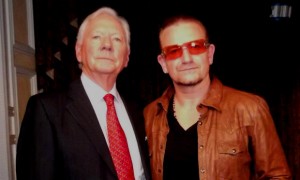All words by Bono, from recent interviews with Charlie Rose and Gay Byrne, transcribed from video clips by Interference editorial staff.
You want to know what brought Jessie Helms to tears? I can tell you.
I said there are 2003 verses of scripture that pertain with the world’s poor, none them about judgment, sir. Christ never speaks of judgment. Sorry, in the Old Testament there is scripture about judgment, but Christ never speaks of judgment except once. It is how we deal with the poor. It’s that thing, you know, as much as you treated the least of these you treated me in Matthew.
And he just started, the great cold warrior, just melted because the scriptures are powerful. And that’s when Christ started his mission, he started to talk about, you know, the blind will see, I want to visit the sick, the people in prison, and serve the poor. That’s what it’s about. If it is not about that for me, then I’m not in the room.
The problems of the world are problems of the human spirit. Songs come out of that. If that makes sense, but you know, a love song can be the most political song.
The greatest protest song could be to write Motown, as Diana Ross singing, “Baby I Love You.” In those times, where joy is an act of defiance. A pop song is an act of defiance. Nile Rogers, you know he is playing on this Daft Punk single. I idolize him. He talks about when he— he came from a rough, rough place—when he wrote, “Good times, Good times,” or “We Are Family,” that wasn’t where he came from. He wrote the future he wanted to live in. He wrote those, so he could have those good times. So I think a love song can be defiant, it can be the biggest protest song you’ll ever write.
Topical songs—we don’t write that many of them. We’ve written powerful songs: “Sunday Bloody Sunday,” “Bullet the Blue Sky,” “Walk On.” Every few years, one arrives, but I’m certainly suspicious of it because I know the problems of the world are the problems of the human spirit. And the problems of the human spirit are the problems of the human heart, and the hypocrisy of the human heart is what you are looking at across this table, Charlie Rose, cause I have it. And we all have it, and we are afflicted by it and pop music is about that.
Dreaming is a thing of the 60s; doing is a thing we have to be a part of now.
Our music—these were prayers of a kind. What were we doing hanging out with these people who didn’t understand this? They’d somehow turned God into a kind of very retail relationship. You had to declare it. Something had to have a Christian sticker on it. I don’t understand that. Does a tree have a sign up saying ‘Made by God’? No. It’s just there. It declares itself. The creation does. Music does. Poetry does.
More importantly, the problem with gospel music is a lot of the time it’s in denial of where we’re really at. A lot of the time it’s trying to brush things under the carpet. Which is where the blues comes from. The blues—Robert Johnson, hellhound on my heel—starts to speak the truth. If you know anything about scripture, it’s the truth that sets you free. We started to see the lie—and maybe that’s too strong a term—that was in gospel music, in all this happy-clappy kind of stuff. We started to see the truthfulness in blues. Of course, rock n roll is the combination of the blues and gospel—the highness, the headiness of gospel and the mud of the Mississippi. That is where our music comes from. That moment is the fusion really.
I had one idea, really, when it came to activism. Don’t let it be a creation of the left. Don’t leave the right out. Try to find a radical center. Why divide the audience in half?
I am a believer in the church. I don’t think there’s loads of different churches. There is one church; it’s just smashed into loads of different pieces. I think that the spirit, the Holy Spirit if you want to call it that, is much more anarchic than we think. It comes like a wind. You don’t know where it comes from, you don’t know where it goes, scriptures say. It continually renews itself, moves forward.
Religion is a slightly different thing. People got to be very careful of thinking they have a monopoly on the truth.
There’s the thing everyone reads out at their wedding, that beautiful scripture in Corinthians. Faith, hope, and love. And the greatest of these things is love Why is that?
Why is love more important than faith? The answer is found a few verses later. Which is that beautiful, beautiful passage, especially beautiful in King James. “For now we see through a glass, darkly; but then face to face: now I know in part; but then shall I know even as also I am known.” Wherever you see religious people where their faith is more important than love, they’ve got it the wrong the way around, in my view.
The scripture is so very eloquent about love. I can’t really figure it out how people have so maligned Christ; we don’t even know that Christ ever intended to set up a religion. He asked much bigger questions of people. Questions about surrender. That’s what would be a better preoccupation than doctrinal matters.
I look to the scriptures for poetic truth as well as historical stuff. There was a historical Jesus. The person of Christ is my way to understand God. [I pray] to Christ. I pray to get to know the will of God, because then the prayers have more chance of coming true.
Dignity is not what’s important. Integrity is important. And humility. I don’t mean the fake humility; I can do that quite well. But true humility, you know your place within the scheme of things. It’s a tiny fragment, but it is loved and appropriately placed.
I believe God is interested in us, in the detail of our lives. I think that’s remarkable but I accept that it also sounds preposterous to a lot of people.
When we let go of things, when we surrender, we are released to be ourselves more.
Admin
Latest posts by Admin (see all)
- Apirl 2014 U2 Arrives - December 22, 2013
- ‘Ordinary Love’ Nominated for Critics’ Choice Award - December 19, 2013
- Sacred Stables, Sacred Stadiums: Lifting the Veil on “Zooropa” at Christmas - December 19, 2013




